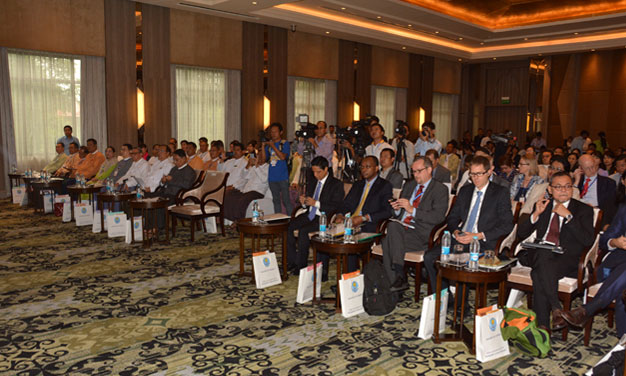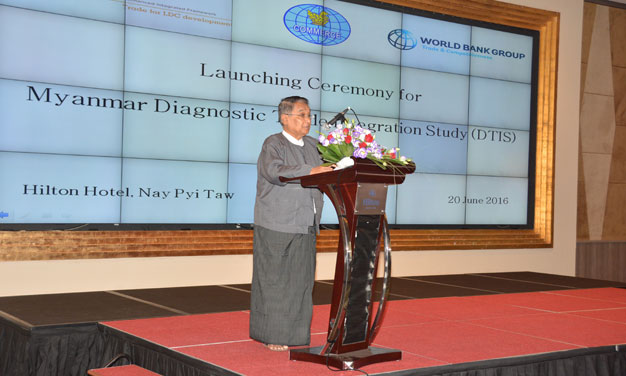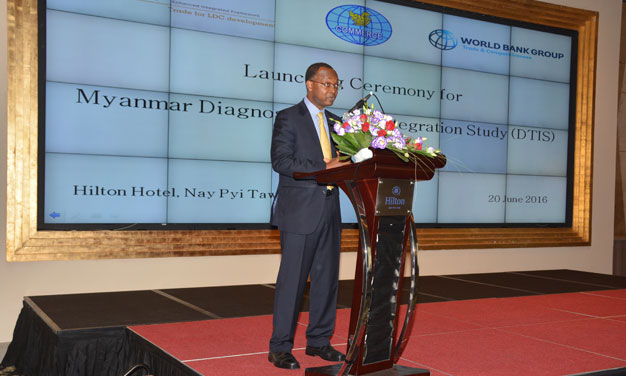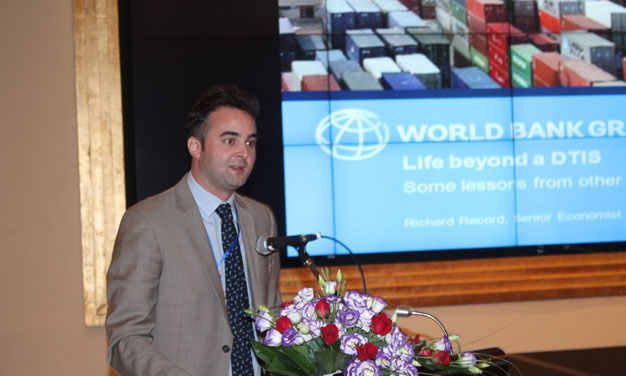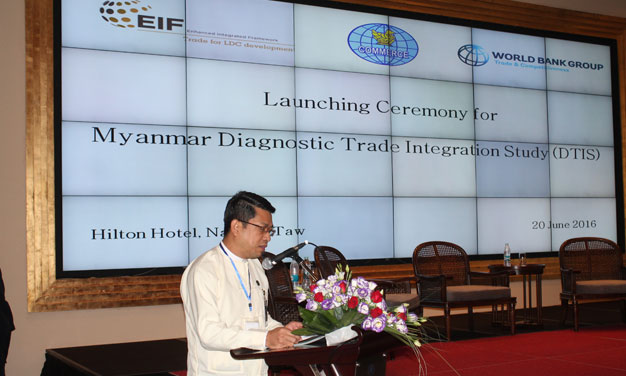Workshop on DTIS (Scope, Approach and Process) on EIF, a trade development assistance under the auspices of the Ministry of Economy and Commerce
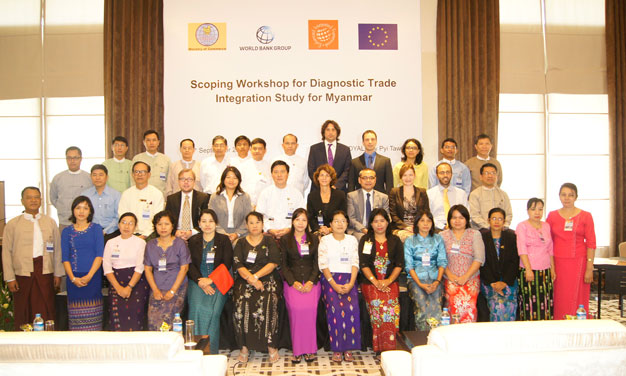
The Ministry of Economy and Trade is implementing the EIF process, a trade development assistance of the World Trade Organization (WTO). The Scoping Mission Workshop was held on 16 September 2014 at 9 am at Park Royal Hotel (Nay Pyi Taw) to implement the DTIS Phase of Trade Development E-learning among these EIF activities. The opening ceremony was attended by the Chairman of the National Steering Committee (NSC) on the EIF process, the Ministry of Economy and Commerce; On behalf of the Union Minister, Deputy Minister for Economy and Commerce Dr Pwint San addressed the opening speech.
In his opening remarks, the Deputy Minister said that the EIF process, which is a trade development assistance, is a long-term process, and in addition to the action plan to be implemented, it also integrates the necessary financial and technical assistance to carry out the project. The EU has acted as a Donor Facilitator in the EIF process. At the DTIS level, the World Bank will act as the Main Implementing Entity (MIE). The workshop was held to invite relevant government departments to formulate the concept notes required for DTIS. In addition, to be implemented in accordance with government policies A National Steering Committee (NSC) has been formed. As the private sector is very important, representatives from the private sector are included in the committee. The EIF process must be carried out with the assistance of development partners, and in the implementation of the process, it must be implemented in the form of a Public-Private Partnership. This requires the support and cooperation of all stakeholders. We believe that we can achieve success by working together. As the private sector is very important, representatives from the private sector are included in the committee. The EIF process must be carried out with the assistance of development partners, and the implementation of the process must be in the form of a Public-Private Partnership. This requires the support and cooperation of all stakeholders. We believe that we can achieve success by working together. As the private sector is very important, representatives from the private sector are included in the committee. The EIF process must be carried out with the assistance of development partners, and the implementation of the process must be in the form of a Public-Private Partnership. This requires the support and cooperation of all stakeholders. We believe that we can achieve success by working together. It must cooperate in the form of Public Private Partnership. This requires the support and cooperation of all stakeholders. We believe that we can achieve success by working together. It must cooperate in the form of Public Private Partnership. This requires the support and cooperation of all stakeholders. We believe that we can achieve success by working together.
The opening ceremony of the workshop was attended by representatives from trade-related government agencies. The ceremony was also attended by 13 experts from the World Bank and International Financial Cooperation (IFC).
Representatives from the World Bank, Myanmar's trade development partner, also addressed the opening ceremony of the EIF process workshop in Nay Pyi Taw.
In the afternoon, the Ministry of Economy and Commerce; Senior officials from the Directorate of Trade; Experts from the World Bank discussed the relevant issues, and representatives from trade-related government agencies who attended the meeting asked questions. Recommendations were made.
A total of 45 people attended the workshop which was held on 16 September 2014 and the workshop was successfully held at 4:30 pm.
Focus Group Discussion (FGD) for DTIS Report under EIF, a trade development assistance under the auspices of the Ministry of Economy and Commerce
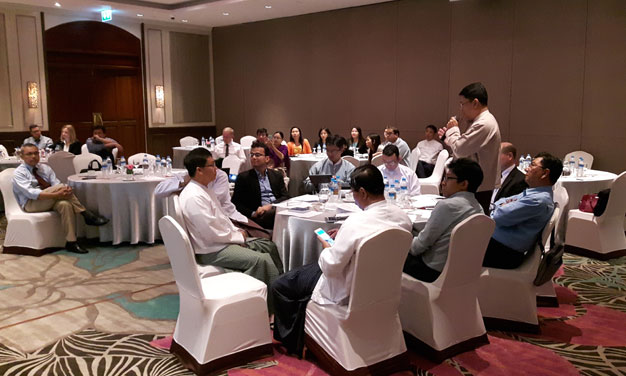
The World Bank is responsible for the DTIS process under the EIF program implemented by the Ministry of Commerce. Holding seminars on Mid Term Plan (MTP) issues; Focus Area Action Matrices on Trade Policy, Holding seminars on Standards and Quality Infrastructure Focus Area Action Matrix, Discussion on Trade Facilitation and Logistics issues, Trade Policy, Standard and Quality, Focus Group Discussion (FGD) was held on 8-2-2016 at Chatriun Hotel Royal Lake in Yangon and 9-2-2016 at Hotel Hillon in Nay Pyi Taw for Food Safety and SPS. Coordination meetings were held at Chatriun Hotel Royal Lake in Yangon on 15-2-2016 for Trade Facilitation and Logistics. On 17-2-2016, discussions were held at Mandalay Hill Resort Hotel in Mandalay on Trade Facilitation and Logistics issues included in the DTIS Report.
Release Ceremony of Myanmar Comprehensive Trade Analysis Report
Launching Ceremony for Myanmar Diagnostic Trade Integration Study in collaboration with the Ministry of Economy and World Bank Group at the Hilton Hotel; Nay Pyi Taw 2016 Vice-President (1) U Myint Swe; Ministry of Economy and Commerce; Union Minister Dr Than Myint; Ministry of Transport and Communications; Union Minister U Thant Sin Maung; Ministry of Planning and Finance Deputy Minister U Maung Maung Win and departmental officials; Chairman and representatives of the Myanmar Federation of Chambers of Commerce and Industry; Dr. Ratnakar Adhikari, EIF Executive Director of the World Trade Organization; Mr. Abdoulaye Seck, Country Manager, World Bank;
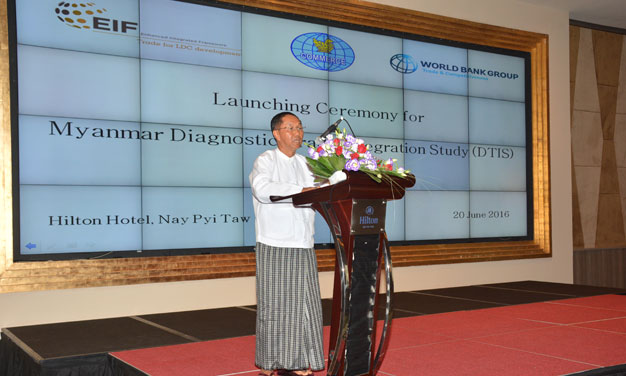
The Vice-President (1) U Myint Swe gave an opening speech at the ceremony. The report is part of the World Trade Organization's (WTO) Enhanced Integration Framework (EIF) for Trade Assistance for the Development of Trade Sectors in the Least Developed Countries (LDCs) such as Myanmar. Today, the World Bank initially forecast 2.9% growth, up from 2%. It was reduced to 4%. Weakening of global trade in developed countries; This is due to the slowdown in capital flow. Emerging markets; Exports from developing countries are linked to the slowdown in global commodities, a key commodity and oil prices. There is an urgent need to reform the structure of economic policy regulation. According to the World Bank report, Southeast Asian countries have grown steadily as global exporters.
The Vice-President said that Myanmar was pursuing a market economy as a priority policy under the new government. As the global economy slows, so do the economies of Asia's major economies. At this time, it is important for Myanmar to rapidly integrate with the rest of the world, especially in the area of trade, and to integrate with the world quickly. This is because the ratio of Myanmar's gross domestic product to trade; In other words, Myanmar's trade dependence is up to 30%. Increasing Myanmar's trade is crucial to the effective use of Myanmar's geopolitical focus.
